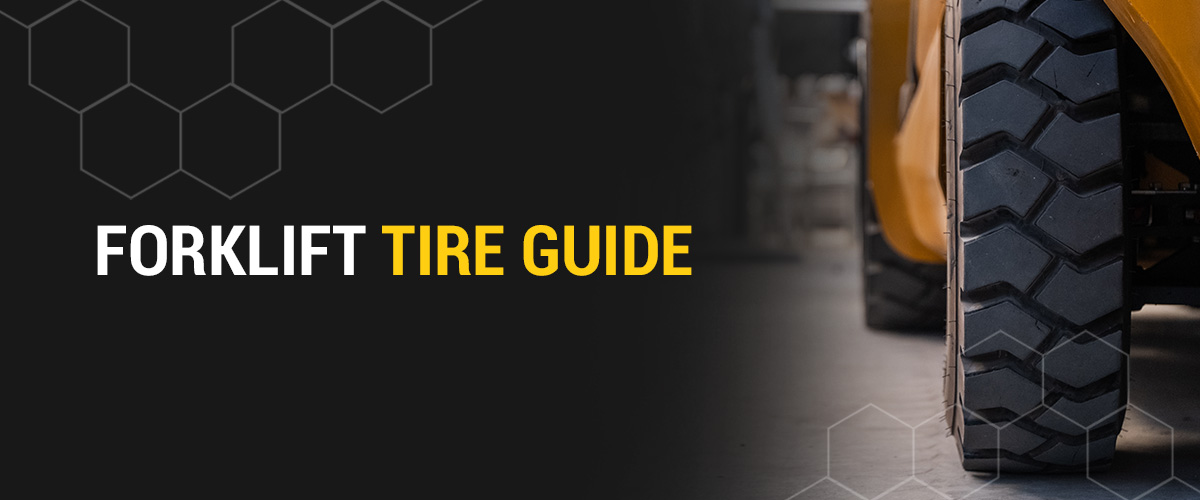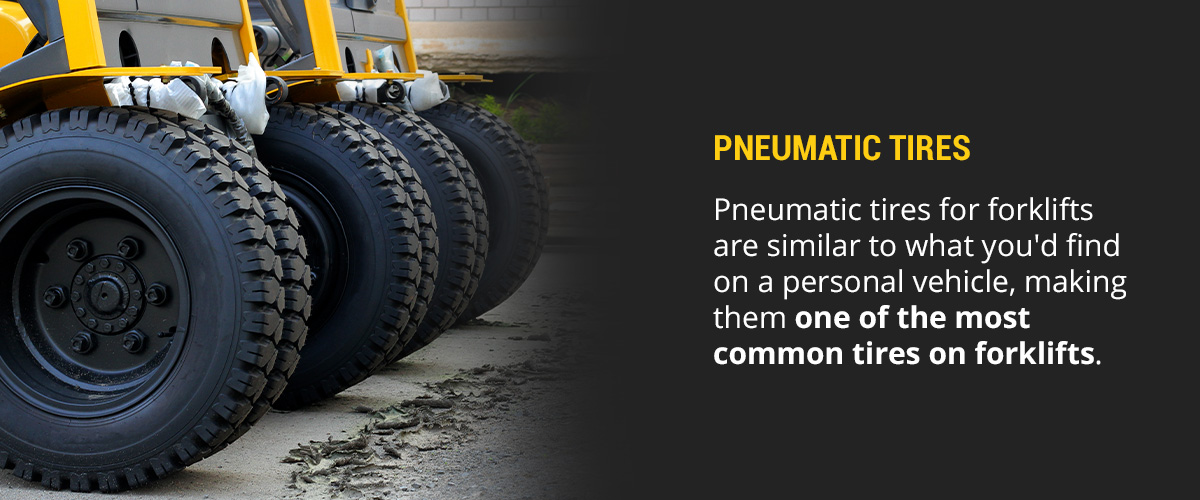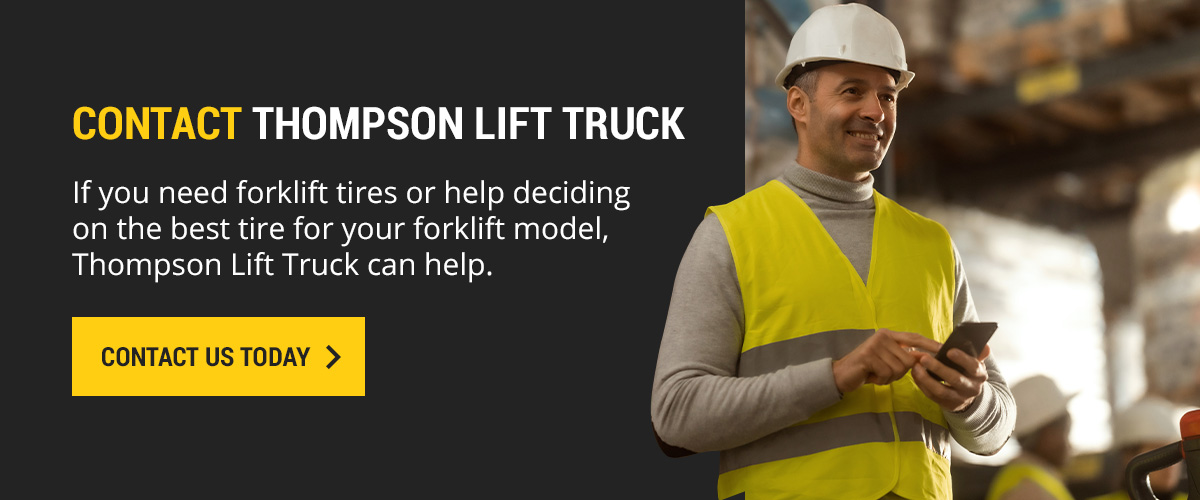
Forklift Tire Guide

Quick Overview: Forklift Tire Types, Selection, and Maintenance
-
Forklift tires vary by type, size, compound, and intended work environment
-
Common options include cushion, pneumatic, solid pneumatic, non-marking, and polyurethane tires
-
The right tire depends on your forklift model, terrain, load demands, and indoor or outdoor use
-
Proper tire maintenance helps prevent blowouts, extend tire life, and reduce operating costs
-
Some forklift tires can be repaired, while others must be replaced based on wear and damage
Forklifts play a crucial role in many business operations, but forklift tires aren’t all created equal. Some tires can be more expensive than others, and poorly maintained tires can blow out and cause unexpected and costly downtime. However, properly maintained tires can improve safety, reduce fuel costs, and improve overall efficiency.
Your applications, forklift model, and usage will determine the best tire for your needs. You may need a specific size, profile, or special compound to get the most from your forklift tires. In this forklift tire guide, you’ll learn everything you need to know to decide what tires to invest in and how to repair tires with leaks.
Types of Forklift Tires
You’ve likely worked with forklift tires before but may not know all your options. If you’re new to forklifts, you may now know much about forklift tires at all. You have several options when it comes to forklift tires, each with different benefits that are suited to various work environments. Forklift tire sizes also vary, and you’ll need to choose the proper size based on your forklift model. Some of the most common types of forklift tires include the following:
1. Cushion Tires
Forklift cushion tires are durable and made of solid rubber molded to the steel wheel or band. You can choose from cushion tires with rubber that has traction or is smooth. Cushion tires are best suited to light outdoor and indoor applications with smooth surfaces. Cushion tires have a smaller turning radius, which improves your maneuverability at the work site.
2. Pneumatic Tires
Pneumatic tires for forklifts are similar to what you’d find on a personal vehicle, making them one of the most common tires on forklifts. These tires are made from traction rubber and filled with air. They typically feature deep tread and durable rubber, making them a long-lasting investment. Pneumatic tires also make suitable forklift snow tires since they work in outdoor and indoor applications.
3. Solid Pneumatic Tires
Solid pneumatic tires are made from solid rubber and can be used for indoor and outdoor applications. However, they don’t have the same comfort as cushion tires when driving along paved surfaces. Solid pneumatic tires have robust durability and a long life span but have a higher initial investment than other tire types.
4. Non-Marking Tires
If you’re worried about your tires creating black marks on the floor, non-marking tires may be best for your applications. These tires use hydrated silicas and different additives to significantly reduce the risk of black marks on your workplace floor. You can find non-marking tires for different tire types, including cushion, pneumatic and solid pneumatic tires. However, these tires have a shorter life span than other types and can create excess static electricity, so you must include an anti-static strip on your equipment.
5. Polyurethane Tires
Polyurethane tires are lightweight and resistant to splitting or becoming damaged when carrying a load compared to other tires. These tires have a significantly higher life span than some types of tires but should only be used indoors for light applications. Pneumatic tires have the added benefit of low-rolling resistance and good traction.
What Forklift Tire Will Work Best for Your Job?
The right tire depends on several factors, particularly your forklift model and applications. Generally, forklift wheel frames are designed for a specific tire type, usually cushion or pneumatic tires. Your forklift manual or local dealer can tell you whether you can choose a different tire type than recommended. You can generally switch between different types of cushion tires or different types of pneumatic tires. You usually can’t go from pneumatic to cushion or vice versa if your forklift requires a specific type.
If you have to replace tires, choose the same tires for each end of the forklift. While the front and back tires can differ from each other, the two front tires and two rear tires should be the same.
Your applications will significantly affect what type of tire you can choose. The different tire types will affect how they perform at your workplace. For example:
- Smooth tires are best suited to indoor applications where traction isn’t as necessary.
- Traction tires are suited to numerous applications and are considered general-purpose, allowing you to use them indoors and outdoors.
- Wide-tracked tires are used for indoor and outdoor applications and can operate in all seasons.
- Grooved tires are better suited to large forklifts, extreme operating conditions, and heavy loads.
Once you’ve determined what your working environment needs, you can narrow down your tire options and choose based on the specifications of your forklift. Your forklift dealer can help you make the best choice based on your forklift model and operational needs.
How Forklift Tire Repairs Work
Forklift tires can be punctured, causing a flat and unwanted downtime. However, these tires can sometimes be repaired if the damage isn’t bad. The process works similar to how you’d repair a tire on a personal vehicle. A forklift tire needing repair will be removed, and the leak located. Once the leak is identified, a plug is installed, and the tire is placed back onto the equipment.
However, some tires must be replaced when a repair isn’t possible. Tires eventually need to be replaced once they’ve experienced enough wear and tear, and some factors can cause tires to wear out sooner, including:
- Chemical contact
- Low tire pressure
- High temperatures
- Rough terrain or driving surfaces
Smoother surfaces make the tires last longer so they won’t require a replacement as soon as tires driving on rough surfaces. Replacement costs vary based on the tires you need for your forklift. Pneumatic and cushion forklift tires cost around the same but don’t have the longest life span compared to other forklift tires. Solid pneumatic and polyurethane tires have some of the longest life spans with the proper care, but they also have a higher initial investment.
The right tire will depend on how often you use your forklift and the tasks it performs at your work site. Your forklift dealer and servicer can give you the best advice for the proper replacement tires to help you maintain your uptime and increase productivity.
Contact Thompson Lift Truck for Forklift Tire Parts, Service, and Inventory
If you need forklift tires or help deciding on the best tire for your forklift model, Thompson Lift Truck can help. We offer the highest quality tires and forklift parts to help you keep your equipment in the best condition possible. Our team can assist you in finding the right parts for maintenance and repairs so you can rest easy knowing we’ve got you covered. We offer various forklift models, whether you need new, used, or rental for your applications.
We also offer maintenance and forklift services and can handle any repairs and replacements behind the scenes so you can focus on your business. You can schedule a service to get started or request a quote.


